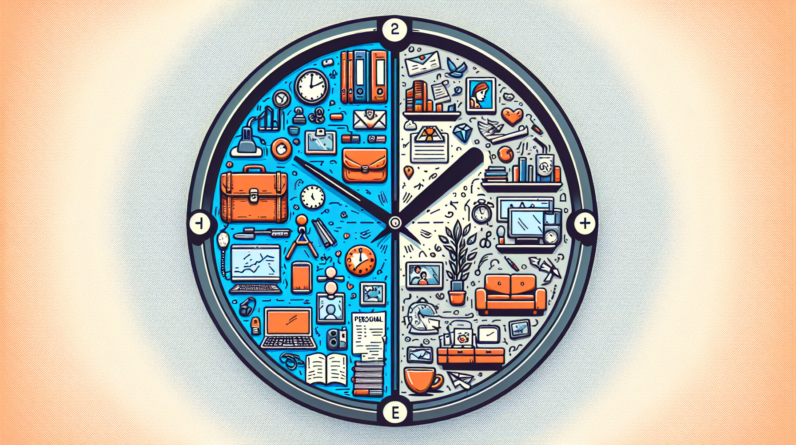
In today’s fast-paced world, it’s easy to get caught up in the demands of work and neglect our own well-being. However, understanding the importance of self-care is vital in achieving work-life harmony. By prioritizing self-care, you can enhance your physical and mental well-being, reduce stress, and ultimately perform better in all aspects of your life. So, take a moment for yourself and discover how self-care can be the key to achieving overall balance and fulfillment.

Understanding work-life harmony
Defining work-life harmony
Work-life harmony refers to the ability to effectively balance the demands of your work life with your personal life, resulting in a sense of overall well-being and fulfillment. It is not about seeking a perfect balance between work and personal life, but rather finding a state of harmony where both aspects can coexist in a way that suits your individual needs and priorities.
The challenges of achieving work-life harmony
In today’s fast-paced and competitive world, achieving work-life harmony can be quite challenging. The pressures and expectations of work, combined with personal responsibilities and commitments, can often leave you feeling overwhelmed and stressed. The constant juggling act between professional and personal life can take a toll on your physical and mental well-being if not managed effectively.
Recognizing the impact of self-care
Why self-care matters
Self-care is the practice of actively taking care of your physical, mental, and emotional health to maintain overall well-being. It is a crucial component of achieving work-life harmony because it allows you to recharge and rejuvenate, enabling you to perform at your best in all areas of your life. By prioritizing self-care, you are investing in yourself and ensuring that you have the energy and resilience to navigate the challenges that come your way.
How self-care contributes to work-life harmony
Self-care plays a significant role in achieving work-life harmony by promoting balance, reducing stress, and enhancing overall happiness. When you prioritize self-care, you are better equipped to manage your responsibilities effectively, both at work and in your personal life. By taking time for yourself and engaging in activities that promote relaxation and well-being, you are better able to tackle the demands of your daily life with a clear and focused mind.
Prioritizing physical well-being
Maintaining a healthy lifestyle
Taking care of your physical well-being is essential for achieving work-life harmony. This includes adopting healthy habits such as regular exercise, nutritious eating, and getting enough sleep. Engaging in physical activity not only improves your physical health but also boosts your mood and increases productivity. Fueling your body with nutritious food provides the energy you need to perform at your best, while adequate sleep ensures proper rest and rejuvenation.
The benefits of exercise and proper nutrition
Regular exercise has numerous benefits, including reducing stress, improving mental clarity, and boosting energy levels. It can be as simple as taking a walk during your lunch break or incorporating a workout routine into your weekly schedule. Likewise, proper nutrition is vital for maintaining optimal physical and mental health. A balanced diet rich in fruits, vegetables, lean proteins, and whole grains provides the nutrients your body needs to function optimally, promoting overall well-being and work-life harmony.
The role of adequate sleep
Adequate sleep is often overlooked but is crucial for your overall well-being. Lack of sleep can negatively impact your mood, cognitive function, and productivity. It is essential to prioritize sleep by establishing a regular sleep schedule, creating a conducive sleep environment, and practicing relaxation techniques before bed. By ensuring you get enough quality sleep, you are setting yourself up for success in achieving work-life harmony.
Cultivating a positive mindset
Practicing mindfulness and relaxation
To achieve work-life harmony, it is crucial to cultivate a positive mindset. Practicing mindfulness and relaxation techniques can help you manage stress and maintain a sense of calm amidst the demands of your daily life. Mindfulness involves being fully present in the current moment, reducing feelings of worry or overwhelm. Techniques such as deep breathing exercises, meditation, and yoga can help you develop a more positive outlook and increase your overall emotional well-being.
Managing stress and avoiding burnout
Stress is a common issue in today’s fast-paced world, and if left unchecked, it can lead to burnout and negatively impact both your work and personal life. It is essential to identify stress triggers and develop effective coping mechanisms. This may include implementing stress-reduction techniques, such as regular exercise, practicing gratitude, seeking support from loved ones, or engaging in hobbies that bring you joy. By managing stress and avoiding burnout, you are better able to maintain work-life harmony.
Building resilience and mental strength
Resilience and mental strength are essential qualities to cultivate when working towards achieving work-life harmony. Building resilience allows you to bounce back from adversity, handle setbacks, and maintain a positive outlook, even in challenging situations. This can be achieved through self-reflection, setting and achieving personal goals, and seeking support from a mentor or a therapist when needed. By developing resilience and mental strength, you are better equipped to navigate the ups and downs of work and personal life and maintain a sense of balance and well-being.

Expressing emotions in a healthy way
Nurturing emotional well-being involves recognizing, acknowledging, and expressing your emotions in a healthy and constructive manner. It is essential to allow yourself to experience a wide range of emotions and not suppress them. Finding healthy outlets for emotional expression, such as journaling, talking to a trusted friend or therapist, or engaging in creative activities, can promote emotional well-being and contribute to work-life harmony.
Building and maintaining meaningful relationships
Meaningful relationships are an essential component of work-life harmony. Cultivating and maintaining relationships with family, friends, and colleagues provides a support system and a sense of belonging. It is important to invest time and effort into nurturing these relationships, whether through regular socializing, active listening, or engaging in shared activities. Strong relationships can foster a sense of support, connection, and happiness, positively impacting both your personal and professional life.
Setting boundaries and managing expectations
Setting boundaries and managing expectations is crucial for maintaining work-life harmony. It involves clearly defining limits on the time, energy, and resources you are willing to allocate to work and personal commitments. By establishing boundaries, you can safeguard your well-being and prevent burnout. Communicating your limits effectively and managing expectations, both at work and in your personal life, will help ensure that you have time and energy for the things that truly matter.
Balancing personal and professional commitments
Effective time management
Effective time management is key to finding balance between personal and professional commitments. It involves identifying priorities, setting realistic goals, and allocating time accordingly. By creating a schedule or a to-do list and organizing tasks based on their importance and urgency, you can ensure that you are dedicating time to both work and personal life. Time management also includes learning to delegate or say no when necessary, allowing you to focus on what truly matters.
Setting realistic goals and priorities
Setting realistic goals and priorities is essential for achieving work-life harmony. It is important to identify your main objectives in both personal and professional spheres and align your actions accordingly. Setting achievable goals allows you to stay focused, motivated, and balanced. It is essential to periodically reassess your goals and adjust them as needed to ensure they align with your values, priorities, and overall well-being.
Creating boundaries between work and personal life
Creating clear boundaries between work and personal life is crucial for achieving work-life harmony. This involves establishing designated times and spaces for work-related activities and setting aside dedicated time for personal activities and relationships. It may also involve setting boundaries around technology use, such as turning off work-related notifications during personal time. By creating these boundaries, you can prevent work from encroaching on your personal life and ensure that you have time and energy for self-care and meaningful connections.

Enhancing personal growth and development
Continuing education and skill development
Personal growth and development are essential for achieving work-life harmony. Continuously seeking opportunities for learning and skill development can contribute to your overall satisfaction and success in both personal and professional realms. This may involve participating in workshops, attending conferences, pursuing additional education, or seeking out mentors. By investing in your growth, you are expanding your knowledge, skills, and personal fulfillment.
Setting personal goals and pursuing passions
Setting personal goals and pursuing your passions is a key aspect of work-life harmony. It is important to identify your interests, hobbies, and aspirations outside of work and make time for them. Setting goals related to these areas can provide a sense of purpose and fulfillment, allowing you to maintain a well-rounded and fulfilling lifestyle. Whether it is engaging in a hobby, learning a new skill, or pursuing a passion project, dedicating time to activities that bring you joy and fulfillment is essential for work-life harmony.
Investing in self-reflection and self-improvement
Self-reflection and self-improvement are integral to the process of achieving work-life harmony. Taking time to reflect on your values, strengths, and areas for growth can help you make informed decisions about your personal and professional life. Journaling, meditating, or seeking guidance from a mentor or therapist can facilitate self-reflection. Actively seeking ways to improve yourself, whether through personal development courses, therapy, or coaching, can contribute to your overall well-being and success.
Fostering a supportive work culture
Promoting work-life balance policies
Creating a supportive work culture that values work-life harmony is essential. Employers and organizations have a role to play in fostering an environment that supports their employees’ well-being. This can include implementing policies that promote work-life balance, such as flexible working hours, remote work options, and paid time off. By prioritizing work-life balance, employers can create a positive and productive work environment that enables employees to thrive in their personal and professional lives.
Encouraging open communication and flexibility
Open communication and flexibility are essential components of a supportive work culture. Encouraging employees to communicate their needs, concerns, and challenges fosters an environment of trust and collaboration. Employers can offer flexible work arrangements, such as compressed workweeks or job sharing, to accommodate their employees’ personal commitments and preferences. By promoting open communication and flexibility, organizations can support their employees in achieving work-life harmony.
Providing resources for self-care
Employers can also provide resources and support for employee self-care. This can include organizing wellness programs, mindfulness workshops, or access to mental health resources. Promoting a culture that encourages self-care recognizes that employees’ well-being is crucial for their overall performance and job satisfaction. By providing resources for self-care, employers can contribute to a healthier work-life balance and a happier, more productive workforce.
Overcoming common barriers to self-care
Guilt and self-judgment
Guilt and self-judgment are common barriers to practicing self-care. Many individuals feel guilty for prioritizing their own needs or perceive self-care as selfish. However, it is important to recognize that self-care is essential for your well-being and overall ability to fulfill your responsibilities. Let go of any guilt or self-judgment and embrace self-care as a necessary part of achieving work-life harmony.
Lack of time and prioritization
A lack of time is often cited as a barrier to practicing self-care. However, it is important to recognize that self-care does not have to be time-consuming or elaborate. It can be as simple as dedicating a few minutes each day to engage in activities that bring you joy, relaxation, or rejuvenation. By prioritizing self-care and recognizing its importance in achieving work-life harmony, you can find small pockets of time throughout your day to invest in yourself.
Societal and cultural expectations
Societal and cultural expectations can also be barriers to self-care. Many individuals feel pressure to constantly be productive or prioritize work above all else. It is important to challenge these expectations and redefine success on your own terms. Recognize that self-care is not a luxury, but a necessity for your overall well-being. By shifting societal and cultural perceptions, you can create a mindset that puts self-care and work-life harmony at the forefront.
Creating a personalized self-care plan
Identifying individual self-care needs
Creating a personalized self-care plan starts with identifying your individual needs. Reflect on the activities, hobbies, or practices that bring you joy, relaxation, and rejuvenation. Consider your physical, mental, and emotional well-being and assess which areas require attention. By identifying your individual self-care needs, you can customize your plan to suit your unique circumstances and priorities.
Developing sustainable self-care habits
Consistency is key when it comes to self-care. Developing sustainable self-care habits involves incorporating activities into your daily or weekly routine that you can realistically maintain over the long term. Choose self-care practices that align with your schedule and preferences, and approach them with intention and commitment. By making self-care a regular part of your life, you are prioritizing your well-being and ensuring that you have the resources to achieve work-life harmony.
Adjusting the plan as needed
A personalized self-care plan is not set in stone. It is important to periodically assess and adjust your plan as needed. As your circumstances and priorities change, so too should your self-care practices. Be flexible and open to trying new activities or adjusting your routine to better suit your needs. By remaining proactive and adaptable, you can continuously optimize your self-care plan to support your ongoing journey towards work-life harmony.
In conclusion, achieving work-life harmony is a meaningful pursuit that requires intentional efforts and a focus on self-care. By recognizing the impact of self-care, prioritizing physical well-being, cultivating a positive mindset, nurturing emotional and social well-being, balancing personal and professional commitments, enhancing personal growth and development, fostering a supportive work culture, overcoming common barriers to self-care, and creating a personalized self-care plan, you can take significant strides towards achieving work-life harmony and experiencing a more fulfilling and balanced life. Remember, work-life harmony is an ongoing process, so be patient and kind to yourself as you navigate the journey.






